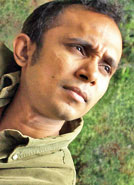Young writer, video director and internationally acclaimed short filmmaker, Malaka Dewapriya is getting ready for his maiden feature film ‘Circumforaneous’- ‘Bahuchithawadiya’, a story on hopes, dreams and imaginations of the younger generation.
Graduate in International Relations and History from the University of Colombo, Malaka started his Short Film career with ‘Anxiety’ in (1998) and went on to create eight films including ‘Penetrate’ (2002), ‘Exchange’ (2003), ‘Life Circle’ (2004), Transference (2006), ‘Today’ (2007) ‘Malte’ and ‘End Loop’ in 2008. After graduation, he received a scholarship for the study of Video, Film and New Media at Akademie Schloss Solitude, in Stuttgart, Germany, from 2007 to 2008. Among international acclaims, his short film ‘Life Circle’ was screened at the 10th International Student Film Festival, Tel Aviv, Israel in 2004. ‘Today’ was selected to compete in the final round of CinemadaMare Film Festival in Italy” in the summer of 2008; it competed with over 150 directors from around the world at the semi finals.
Having made an impressive mark in short movie making, this young filmmaker says that he is ready to take up challenges in technology, finance, marketing and releasing usually faced by newcomers to filmmaknig.
 |
| Malaka Dewapriya |
Malaka in the pre-production stage of his film spoke to the TV Times on challenges faced by young filmmakers such as knowing what is lacking in cinema today, why cinema cannot attract audience and the many contemporary issues relating to Sri Lankan cinema.
“People have misunderstood the primary component for a good cinema. What is needed for a good cinema is the expression of life with conceptual richness. This is experienced when we attend international film festivals like in Berlin. Many young filmmakers go there every year ensuring that their creations are armed with conceptual richness,” Malaka described.
“It was in a similar manner that filmmakers like Dharmasena Pathiraja and Dharmasiri Bandaranayake emerged. They did not have big money and recognized producers but had conceptual richness in their creations,” Malaka stressed.
The young filmmaker complained that there is hardly any artistic value in what we see on the television or hear over the radio today. Art can be enjoyed by those who have knowledge on art and those who have updated their knowledge. It is hard for those who are outdated and those with conventional attitudes to enjoy real art.
“This happened to Dr. Lester James Peries when he did ‘Rekhawa’ and Dharmasena Pathiraja when he did ‘Ahas Gawwa’ and Asoka Handagama when he directed his first film,”.
Malaka who was critical on the policies of politicians with regard to cinema said that the existing governments took cinema to the doldrums rather than pushing the industry ahead of times. It does not want to break away from tradition and the routine because it is needed for political survival. ‘That is why the government is promoting a Buddhist cinema. There is no Christian, Muslim or Confucius cinemas in today’s world’ Malaka claimed.
He warned that the dangerous outcome of this trend is that the authorities are using religion to censor art and cinema. “Government censorship on art and cinema influenced by religion made filmmakers like Vimukthi Jayasundara and Sathyajith Maitipe to suffer a great loss,” complained Malaka.
“Today there is a misconception that a civilized society can be established only by art created with ideas of so called moralists. Art is the exposure of contemporary society and this is a worldwide phenomenon accepted from time immemorable’ Malaka stressed.
“Cinema cannot be developed or attract audience by producing films on historical figures like Aba, King Dutugemunu, King Mahinda or on any Jathaka story. The only way to develop cinema is to make artistically rich films,” the young filmmaker explained.
“Cinema is not to give moral lesson. That should be done by education. It is ridiculous, if one expects to only make films with a good moral background when society around us are immoral,” Malaka lamented.
He also complained about the lack of opportunities for young filmmakers to gain recognition. “There are many institutions both government and non-governmental like National Youth Centre or YMBA and YMCA which are dedicated to promote young ideas and talents. The tragedy is that these centres do not generate young ideas to develop the younger generation,” he said. |


